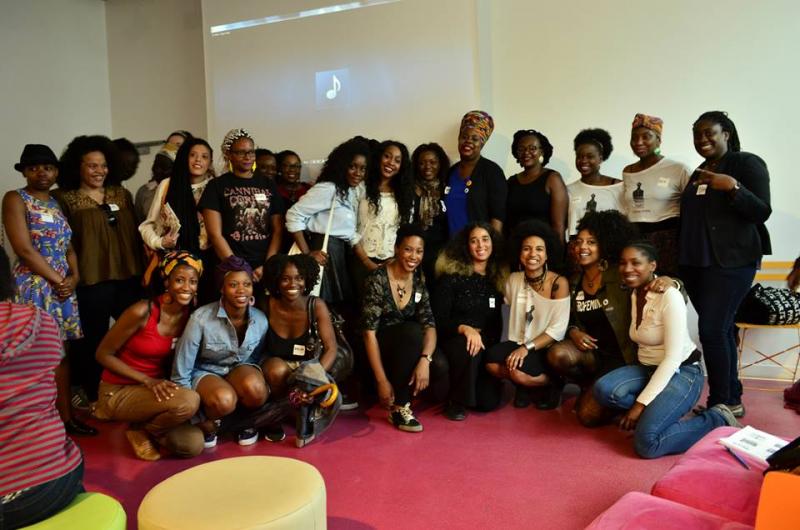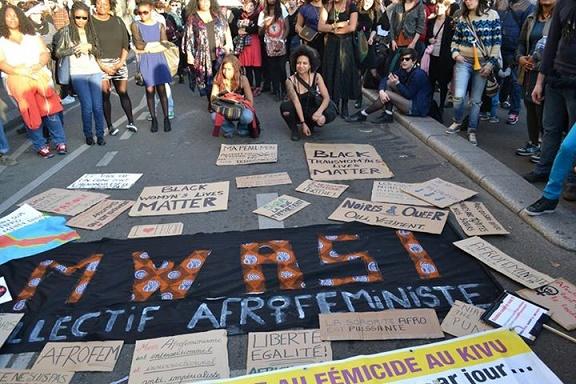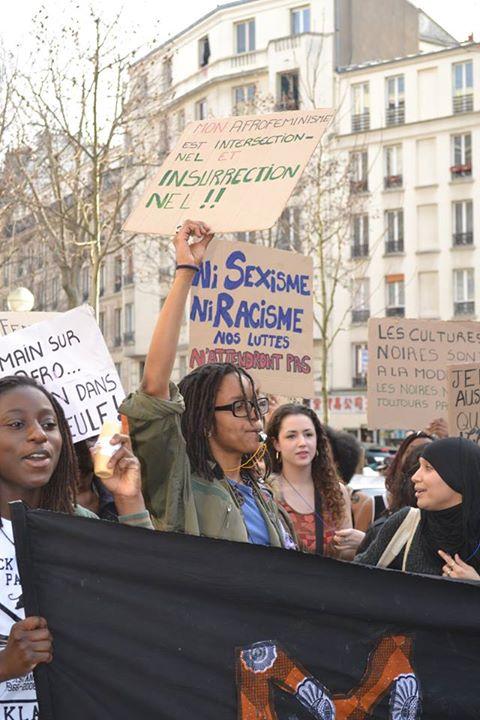
Established in 2014, MWASI - Collectif Afroféministe[1], has twenty active members[2] today, including women who are cisgender, transgender, women who are Black / African and afro-descendant[3], with an average age of 27-30 years, who are fighting for their emancipation as part of an intersectional critique of the capitalist, hetero-patriarchal and racist system.
The presence of black feminists in France isn't new, but has been largely masked and marginalized for decades within the feminist field, particularly academically. Some media "depoliticize afro-feminism, by glamourizing it and portraying it as a new trend and removing all the political and subversive aspects of our collective," says Fania Noël. But, already in the late 1970s, the Coordination des femmes noires (Black Women's Coordination), gathering African and Caribbean women, bore struggles against both racism and sexism[4]. “Even today, black women organize spurred by the motivation to rethink their conditions in a whitriarchal society," adds Sharone Omankoy.

The Challenges of a French Whitriarchal[5] Society
Sharone Omankoy says that in France, black women are living in a whitriarchal system, that is to say a system in which sexism is racialized and where racism is sexualized. However, racism and misogyny are generally treated as separate, and "the fact is that as black women, it is not possible for us to establish a hierarchy between the two or prioritize one struggle over the other, so we do not recognize ourselves in white feminism that ignores the issue of race, and which rules out black women, and more generally non-white women. Thus the collective has been designed so that each black woman could speak her voice and articulate her emancipation". Fania Noel adds in this regard that MWASI came about when African women activists and black African descendent women activists, who had been active in anti-racist and feminist groups, felt the need to unite their struggles against racism and sexism within a collective framework to go beyond individual strategies and undertake strategies for collective intersectional actions[6].
"By excluding our experiences, white feminists do not critically analyze their own role in this whitriarcal system. This leads us to reflect on privilege deconstruction mechanisms in movement groups, regarding racism or sexism. How to deconstruct racism when one is white without awareness of one's privileges? How to deconstruct sexism when you're a man? It therefore seems essential to us to deconstruct these privileges. For us, afrofeminism seeks to eliminate these oppressive systems in their complexity. We aim to bring together the experiences of African women, women who are black, mixed, and of African descent, in a struggle that is itself both decolonial and anti-patriarchal," Omankoy continues.
Regarding attempts to compare French afro-feminism with black American feminism, Omankoy says "The French context and French colonial history followed a different course and is different from the US/American context. Despite similarities, our European realities are not those of African American women. As a result, we challenge ourselves to develop a local afro-feminism based on our living conditions in the French context. This does not prevent us from standing in solidarity with our sisters' struggles across the worldwide black diaspora." Noel notes that black American feminism has helped develop analytical tools including the concept of intersectionality and that members of the collective are committed to disseminating knowledge to allow a reclaiming of analysis tools, namely by translating concepts from English to French.

"Don't liberate us, we'll take care of it"
Within a pluralistic afro-feminist vision, which weaves together a range of voices of African women and women of African descent, Annette Davis recalls the importance for these actors to move from the status of research object to that of political subject defining her own political agenda.
As a result, members of the collective stand firm in their choice of racial and gender self-segregation as a form of self-emancipation. "This choice to self-segregate makes sense for us, but is highly contested in the eyes of a universalizing, assimilationist society, which regularly labels us as communitarian. It is essential to distinguish the communitarianism of people in a dominant position, which reproduces the whitriarcal system, and the willingness to come together to fight an oppressive system and develop emancipatory strategies," says Omankoy[7].
Following the launch of the United Nations' International Decade for People of African Descent, Noel recalls the need to take into account issues of reparations for slavery and colonialism, including the body and the use of women's bodies; and not to relegate it to a decade of celebration while serious crimes were, and are still being committed. In particular, she considers that the United Nations spaces are "spaces we prefer not to integrate and even if they incorporate us, it is to legitimize the system and prove the strength of the system to incorporate criticism and assimilate again, which gives it even more power. Strategies of dismantling from within do not work."
MWASI members' actions are diverse, ranging from street demonstrations and distribution of food and personal hygiene products in migrant camps, to organizing and participating in knowledge sharing events. "We take it to the streets, we go to demonstrations, and we mobilize also on social networks. All our writing is tied to a street activism practice. The idea is to reflect our diversity within the collective and to bring all of that to the street. It is also essential to link our projects to current affairs so we can make our presence felt, especially on issues that affect black women in the Global South, because there is always a presence deficit in this type of mobilization. We also look at queer issues from the perspective of black women, and racialized people generally because this is one of our concerns[8]. We are a feminist, anti-racist, anti-capitalist, anti-colonialist collective and all transformative justice issues are of interest," emphasizes Noel.
MWASI thus anchors its mobilizing capacity on strategic alliances with, among others, women from popular neighborhoods, trans* and sex workers rights associations, decolonial feminist activists such as Islamic feminists or again with African diaspora associations. But according to Noel "there are not many intersectional movements in France, the main challenge is to survive and raise our voice because we can sometimes find ourselves in coalitions where what we bring to the table isn't visible. The challenge is to be sustainable and resist the attempts of colonialism to swallow our collective, as for example when a white man wants to become a member. The bigger we become the more we'll be able to push back against these attempts."
Omankoy concludes, "MWASI is our survival space, a necessary space where African and afro-descendant women can ally to rethink the conditions of their emancipation because we are political and social subjects, at the intersection of multiple oppressions. MWASI demands a total emancipation of our lives, by us and for us. Don't liberate us, we'll take care of it."
2224x1253.jpg)